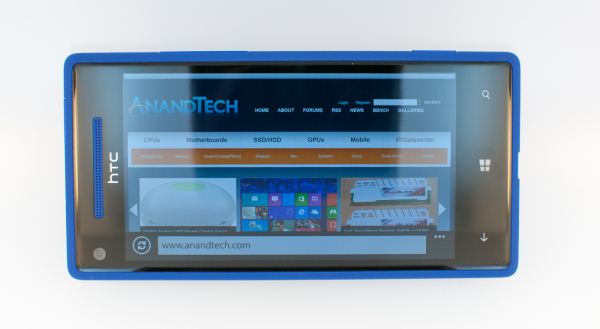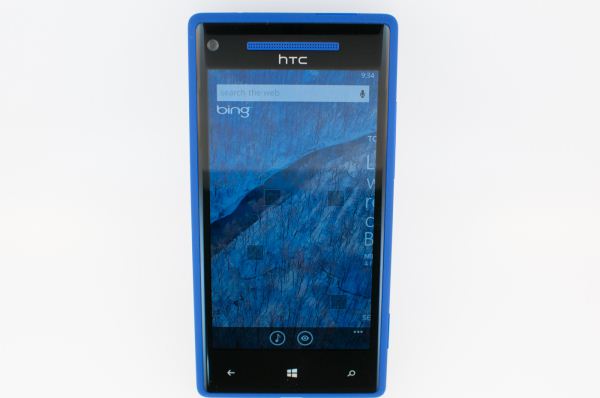Windows Phone 8 and Windows Phone 8X by HTC Preview
by Brian Klug on October 29, 2012 2:10 PM EST- Posted in
- Smartphones
- HTC
- Mobile
- windows phone 8
- Windows Phone 8X
- HTC 8X
- WP8
I titled this section final thoughts but left off the word conclusions because I feel that I need to spend longer with WP8 before really drawing any major conclusions - think of this as something of a big preview. At the same time, my first impressions and thoughts are indeed beginning to solidify. For the platform WP8 is absolutely an evolutionary step, rather than another dramatic re-imagining of Microsoft's vision for smartphones. Reimagining the start screen and including another size of live tiles is a nice touch, but the majority of the WP8 interface is the same as it was before. In fact, the most dramatic of changes with WP8 aren't even really visible to end users immediately with the move to the NT based kernel - the fruits of that move will only come later on in the future of the platform with increased hardware portability, better performance, and easier execution for OEMs and silicon vendors.
Anand made this great observation a while back that each platform was ultimately a reflection of the desktop position of the company behind it. For Google's smartphone platform, that means a full standalone computing environment complete with filesystem, since the search giant lacks its own desktop OS. Android essentially has to compensate for that lack of a real desktop platform by being everything. For iOS, what started as a clear evolution of the iPod has slowly evolved into a standalone platform, but still separate and distinct from OS X. iOS on an iPad for example can exist without a desktop, but doesn't try to supplant one. For Windows Phone, I can't shake the feeling that Microsoft still views the smartphone story as an accessory to everything else - Xbox, Windows 8, and Windows RT. They're three very distinct strategies with subtle differences, but absolutely drive the software decisions that get made each update.
At the same time WP8 feels like a dramatic update over WP7.5, and I find myself wondering what position Windows Phone would be in had it launched with the NT kernel and with this overall platform. The reality is that WP7 was a time to market play and that at the same time Microsoft was busy porting all of the software to deliver a Windows RT, Windows 8, Windows Phone 8 trifecta. Now that it's upon us hopefully some of the real advantages of this triple play will finally be made clear, and to really be the judge of that I need to actually sit down with all three and experience it. From a feature perspective I just wish that WP8 had tweaked a few more things - fast app switching still is a view with JPEG-compressed screenshots and visible artifacts, there's no VPN support, and messaging needs support for more IM protocols to be truly useful. Application support has gotten better over time on Windows Phone, but now the big drive will be getting existing apps updated to support the new features like live tiles and faster app switching. The big question is how many Windows RT or Windows 8 apps developers will end up porting over to WP8, a process which should be relatively painless given the shared frameworks.
For what it is, WP8 is a great update. It brings us the framework necessary to finally get modern hardware for Windows Phone, and will launch with what is without a doubt the best hardware from OEM partners in the 8X and Lumia 920. My time with HTC's 8X has been extremely positive - I think they nailed the industrial design, in hand feel, and the right balance of features for a Windows Phone 8. The OS feels smoother than it ever has everywhere I look and in every app I've tried out.












95 Comments
View All Comments
righteousdesigner - Saturday, November 3, 2012 - link
Will TMO version of HTC 8x will be LTE futureproof like GSN2?Mitch89 - Tuesday, November 6, 2012 - link
My biggest problem with the HTC 8X is that pokey amount of included storage. I'm quite eager to try the WP8 OS, it really does look nice to use and a change from iOS, but the lack of storage totally kills it for me.Having 64GB on my iPhone 4S and now 5 isn't something I could give up, my phone is simply too full. I have probably 5GB of free space after music and video.
If these phones offered microSD slots that you could slip a 64GB card in, I'd consider them, but at 16GB (with a noticeable chunk taken for the OS), no thanks.
roso - Thursday, November 15, 2012 - link
according to htc website it only has a g-sensor - that´s not a gyro-sensor!HTC ONE X e.g. has both: g-sensor & gyro-sensor....
MichaelEvans - Monday, December 24, 2012 - link
I don't know... the plastic case, and the bright colors... get to me, and not in a good way. I just compared this to the HTC Droid DNA and the DNA is more solid. But, I need something on AT&T's 4GLTE. I am in the U.S. (New York) and need speed, most of all, for sending large graphics files.BlueInAtlanta - Sunday, December 30, 2012 - link
I’ve got this on AT&T at home in Atlanta and as a graphic artist the 4GLTe speed is almost mandatory for sending large files or surfing the Web for ideas. I imagine it might be the same for architects, mechanical or aerospace engineers, or anyone else who deals frequently with visuals.